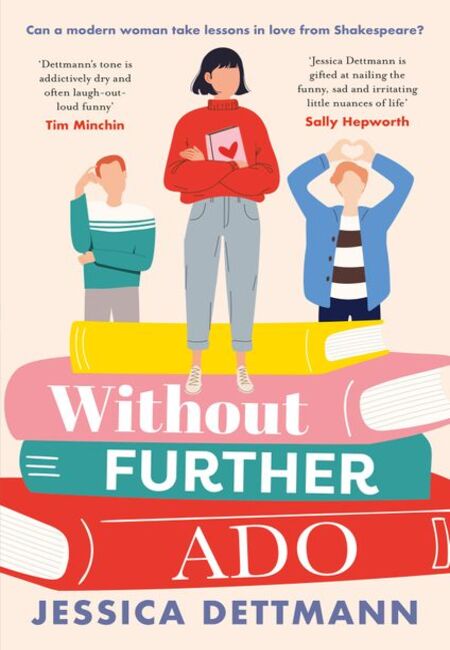(courtesy Harper Collins Publishers Australia)
The world can be divided in any number of interesting ways but for the purposes of this review, let’s just say that there are those who use pop culture as an amusing, sometimes comforting diversion and those, who for thoroughly understandable reasons (reality sucks), use it as sometimes sort of bible or guide for life.
Willa, protagonist of Jessica Dettman’s sparklingly smart novel Without Further Ado, fits snugly and happily into the second group, obsessed with the 1993 film adaptation of Shakespeare’s Much Ado About Nothing, convinced that The Feeling, which arrives in force every time she watches the start of the film, is a surefire way of navigating her way through all kinds of things in life.
Wondering if she should or shouldn’t date someone? Look for The Feeling. Should we publish a romance novel that comes across her desk in the strange hybrid family publishing form she works for? Is The Feeling tingling?
It’s stood her in good stead as she’s built her publishing career from the ground up, meaning that while the rest of the company she works for, owned a rich family who specialise in manuals which are no longer in the demand they once were, is ailing, her small one-person division which publishes romance novels online to great profitability, is doing very nicely thank you.
Granted, it hasn’t really done her any favours romantically with her five-year relationship with flakey Ollie ending very badly and her dating life moribund in the extreme but Willa is a true Much Ado About Nothing believer and nothing will shake her from believing her life can play host to a love as epically wonderful as that enjoyed, eventually, by Beatrice and Benedick.
It was probably just the drama of the wedding that made him say it. Weddings were a strange time for feelings. Just as Halloween is the time of the year when the threshold between the world of the living and the dead is thinnest, and spirits can pass through, the same went for weddings, love and friends. People got confused, they stretched out a hand through the veil of friendship and grabbed someone and thought they loved them. That had to be what it was.
Even as her bestie Kat falls further and further in love with fellow antique dealer George, and drifts out of the single lane of life that she and Willa have occupied for so long together, and her married couple stalwarts Bec and Ralph and their three boisterous and quiet kids depending on which one you’re with at the time, Willa continues to believe.
Blind to some rather unhealthy dynamics in the play, and thus the movie, which speak to some rather crippling dysfunctionality on the part of many of the characters, Willa honestly subscribes to the idea that a story can inform and better real life, a product of believing in love so much that you can bat away any and all indications to the contrary that it is universally a good and wonderful thing.
She’s aided in her Cupidian delusion by the fact that Bec and Ralph have a warm, loving and jocular relationship and that George seems to really love Kat – it takes a while for Willa to warm to him since he’s effectively stealing her best friend away from her – and that her parents are still delightfully in love, but blinded by Shakespeare’s concoction of frothy, fun, words-wise love, she seems unable to translate that into anything approach a real love life of her own.
(courtesy official Jessica Dettmann Facebook page)
As with any good rom-com, and Without Further Ado is one of the best this reviewer has come across in a while, brimming with memorable characters, vivaciously funny and clever dialogue and some super smart writing, the path to actual rather than imagined, pop culture-augmented love is never smooth and Willa bumps across more than her fair share of obstacles to the happy-ever-after ending you know must lie somewhere at the end of the book.
The genius of Dettman is that while you know there’s going to be a romantic epiphany for Willa, and it will likely involve one of the four brothers working at the firm, handsome, grounded, fun Ewan, you never feel like Without Further Ado is just marking time until the finale punctuation mark of love arrives.
In fact, so skillfully written is the book that you lose yourself quite happily in the good and bad parts of Willa’s life with the ending, though quite delightful and lovely, not essential to a book which is not reliant even a little bit on where it all ends up.
In fact, Without Further Ado is one of those rom-coms that’s a blast at the beginning, middle and end, avoiding the “don’t-bore-us-get-to-the-chorus” pop song-inspired dynamic that often bedevils many rom-coms which, while enjoyable, are all weighted to the finish line with nowhere near as much attention paid to the journey to love forever after.
But since Saturday, events had not been following the rules. Now Willa felt like she was living in a board game bought from an op shop, where no one had noticed before putting it on the shelf for sale that the board was from The Game of Life, but the questions were from Cards Against Humanity, the markers were from Monopoly and the dice was the icosahedron from Scattergories, able to throw up twenty possibilities with every roll.
Hence, Without Further Ado is an easy novel to absolutely and completely lose yourself in.
Even when things are dire, and they get catastrophically dire at one point when love, true love fails to follow its expected course for someone close to Willa, the novel retains a highly pleasurable sense of vivacity and fun that fuels its way through all kinds of ups and down, some inflicted by Willa on herself, some not but all of them artfully and humourously delivered in a Sydney, Australia-set story that will delight anyone familiar with the city.
Mirroring the classic Shakespeare comedy and with plot points that harken to its major narrative drivers and touchpoints, Without Further Ado has a great deal of affecting fun exploring the face and form of modern love, how women don’t always come away well from some very unhealthy societal dynamics and how we can often find ourselves beguiled to the point of unwitting, gentle self-damage (or not so gentle; again the novel doesn’t pull any punches at certain key junctures and is all the better and more emotionally muscular for it) by pop culture.
On that last point, it’s super easy to be seduced by pop culture mainstays, especially rom-com ones, because they promise a way to chart a course through the minefields of love and life, but the trouble comes, as it does hilariously and movingly at times for Willa, when we take it some sort of literal instruction and not a frothily fun diversion from the difficulties imposed by real life and the human condition.
Willa, of course, survives her path through the events of the book and her addiction to Much Ado About Nothing, but by the time the charmingly honest Without Further Ado ends, it’s becoming amusingly and abundantly clear that while pop culture stories are a delight and a pleasure to be wholly enjoyed, they are not life guides and keeping them separate may be the best thing you can ever do for yourself.

